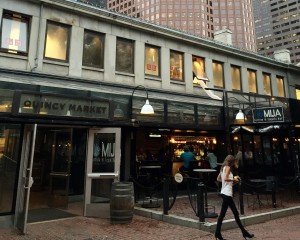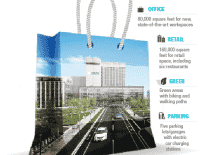Steps from the central rotunda of the Quincy Market building at Faneuil Hall Marketplace, where fading gold-leaf signs bear the names of Colonial-era butchers and produce vendors, the new Uniqlo store appears like something out of another dimension.
LED track lighting illuminates rows of brightly-colored sweaters, tech gloves and puffer coats. Suspended on cables inside a glass enclosure, a trio of mannequins rises and descends inside a stairwell of the 1742 granite building.
Japanese retailer Uniqlo is the first major addition to the marketplace under New York-based management company Ashkenazy Acquisition Corp.’s ongoing $80 million makeover for the 39-year-old marketplace. In July, the Boston Redevelopment Authority approved a master plan laying out the company’s vision for the first major renovation since the marketplace opened in 1976.
More proposed changes are in the pipeline for the 6-acre property. Ashkenazy wants to build a pavilion for a Sephora cosmetics store to replace the long-vacant flower shop building, open a two-story nightclub in the rotunda and convert upstairs offices in the South Market building to an 180-room hotel.
“We want to become less of a seasonal marketplace and more of a year-round marketplace,” General Manager Kristen Keefe said.
Executives say they want to bring back local shoppers to the property, one of the nation’s first festival-style marketplaces. But some longtime merchants say the strategy is just more of the same in a decades-long trend of favoring chain stores at the expense of unique independent retailers.
Two more new pavilions are proposed for another anchor tenant and a café. Cobblestones would be replaced with granite pavers to improve pedestrian flow along pathways, and new lighting would highlight building exteriors.
Outdoor pool and ping-pong tables arrived this summer and more public programming such as Crossfit classes is planned, Keefe said. To make room and “declutter” the promenade, some pushcarts would be clustered near Abercrombie & Fitch on the south end of the property.
Ashkenazi has leased the property from the city since 2011. It’s now seeking permission to bring nightlife to the central rotunda, which is currently used for common-area seating for the food hall during the day. A nightclub operator that has several locations in Boston would run the operation, Keefe said; she declined to name the vendor.
The proposal calls for portable bars to be moved into the first and second floor of the rotunda at night, with capacity for approximately 270 people. The proposed liquor license hours have not been finalized.
On Tuesday, the Boston Landmarks Commission will review proposals to add LED displays, glass guardrails, security gates and digital store directories in the rotunda.
The commission, which has authority over changes to the historic landmark, earlier denied plans to enclose patio space outside the Ames Plow Tavern and Salty Dog Seafood Grille & Bar on the east end of the property. Ashkenazy is now drawing up an interim plan for temporary enclosures that would allow the patios to be used up to 10 months of the year, using portable heaters.
The hotel would occupy the third through fifth floors in the South Market building, but would be subject to a separate large project review by the Boston Redevelopment Authority. Construction could begin as soon as 2018, Keefe said.
Some existing tenants say the changes have disrupted their business, with eight retailers relocated to less-traveled storefronts to make way for the 12,000-square-foot Uniqlo store. New public amenities such as an outdoor lounge area with billiard and ping-pong tables haven’t generated additional foot traffic, said one tenant, who asked not to be identified.
“When it opened, it was all about local vendors, and now we are becoming a mall,” said the tenant. “What draws more people are the street performers, not playing ping-pong or a pool table.”
Mike Tesler, president of Norwell-based consultants Retail Concepts, doesn’t expect the changes to radically upgrade the property’s image.
“It’s a place where tourists go and a place where working people in the immediate area use as one of their lunch or drinks after-work alternatives,” Tesler said. “Rarely, if ever, does anyone from the suburbs ever go there.”
That’s unlikely to change with this month’s arrival of Uniqlo, which already has stores at The Mall at Chestnut Hill, Natick Mall, North Shore Mall and Legacy Place in Dedham, Tesler said. The marketplace needs a signature arrival such as celebrity chef Mario Batali, who chose the Prudential Center for his Eataly restaurant and market, or Irish apparel chain Primark, which recently opened its first U.S. store at 10 Summer St. in Downtown Crossing, he added.
Andrea DeSimone, a vice president at CBRE Grossman Retail Advisors, said the recent opening of the Boston Public Market is a guide for enlivening the Faneuil Hall Marketplace. Hosting local food competitions and seasonal events could boost food traffic at the property, which attracts roughly 50,000 visitors a day, according to management. In contrast, Downtown Crossing has roughly five times that number.
“The question is: what is going to make all of those people walk to Faneuil Hall as opposed to what they have in their neighborhood already?” DeSimone said.




 |
| 

